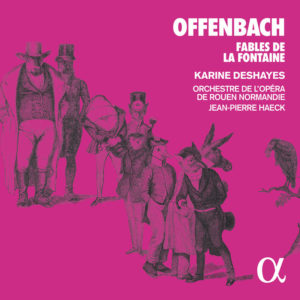GRAMOPHONE Review: Offenbach Six Fables de La Fontaine – Karine Deshayes, Orchestre de l’Opéra de Rouen Normandie/Haeck
 The shocking pink packaging says it all. If Offenbach had a colour then this might be it. Then there’s the quirky illustration of besuited animals relating, of course, to the Six Fables of De La Fontaine – newly minted in bright, often fragrant, orchestrations from the conductor of this jolly album, Jean-Pierre Haeck.
The shocking pink packaging says it all. If Offenbach had a colour then this might be it. Then there’s the quirky illustration of besuited animals relating, of course, to the Six Fables of De La Fontaine – newly minted in bright, often fragrant, orchestrations from the conductor of this jolly album, Jean-Pierre Haeck.
Originally for voice and piano these infectious salon pieces are more scenes than songs – dress rehearsals, if you like, for Offenbach’s stagey career to come. And I think the highest compliment one might pay to Haeck’s orchestrations is that they sound every inch as if the settings were imagined this way. The texts wear their morality lightly, very lightly, and in that vein the vocal lines are fashioned with the joy of singing them written into every phrase. As always with Offenbach they combine an obligatory showiness with the ease of a master craftsman. And that’s the pleasure of the soloist Karine Deshayes – a characterful mezzo with a rangy top and the essential twinkle in her eye.
For the rest we’re gifted a bouquet of Overtures and a bottle or two of bubbly to chronicle Offenbach’s glittering career in musicals, sorry, operettas. As befitting the original German-French purveyor of Strictly Come Dancing numbers – though more for the ballrooms of the elite than our contemporary Blackpool equivalent – the music of these is replete with all manner of waltzes, polkas and insidiously catchy galops. And the essence of them is in the style – well versed by this conductor and his gamely receptive Orchestra de L’Opera de Rouen Normande – wherein the charm of the tunes depends upon how easily they slip off collective bows and the energy is all in the spring of the rhythms. So we can hear castanets without them actually being present in the Spanish-inflected footwork of Les Bavards; we can try to resist bobbing to the infectious allegros of the Madame Favart and Boule de Neige Overtures and imagine that the wistful cello solo of Les Deux Aveugles is a very personal farewell to the days when Offenbach made his living from playing that instrument.
Might the concluding Schüler Polka be Offenbach not so discreetly cocking a snook at that member of the Strauss family? Perish the thought.




